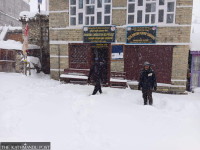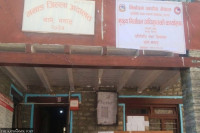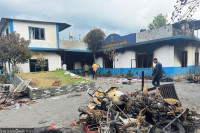Gandaki Province
Experts stress need for youth-centred climate policies in Gandaki Province
At the Climate Dialogue held in Pokhara on Thursday, speakers called for local climate policies, more research funding, and youth participation in combating climate change.
Deepak Pariyar
Experts and entrepreneurs taking part in a climate dialogue held in Pokhara on Thursday emphasised the need for youth-inclusive climate policies at the local level and for the allocation of enough research budget.
The event, titled ‘The Role of Gandaki’s Youth in Tackling Climate Change,’ was organised by The Kathmandu Post in collaboration with the Gandaki Province Policy and Planning Commission and Purak Asia.
Climate researcher Orchid Rosy Puri, youth entrepreneur Tika Ram Poudel and Vice Chair of the Gandaki Province Policy and Planning Commission Krishna Chandra Devkota were the three panelists of the dialogue that was moderated by Biswas Baral, Editor of The Kathmandu Post.
There was also an active participation of other policy experts, researchers, students and activists who expressed concerns over ineffective implementation of national climate policies and stressed local-level initiatives to address the impacts of climate change.
Speaking at the event, Poudel, the youth entrepreneur specialising in waste management, highlighted the disconnect between national policies and local-level implementation.
“Despite several climate strategies at the national level, execution remains weak,” he said. “Also, local policies that encourage youth participation are vital.”
Poudel added that lack of such policies at the municipal level has hindered young people from implementing innovative ideas. “Youth enthusiasm is the driving force in addressing climate issues, but current policies fail to empower them,” he said.
Poudel also called for the establishment of a provincial youth council to coordinate youth participation in climate adaptation. He emphasised that sustainable solutions lie in fostering youth-led climate-friendly enterprises.
Puri, the climate researcher and student of forestry, pointed out the inadequacy of funding for scientific research. She argued that the government’s limited investment in climate-related studies had discouraged youth involvement.
“Even though Gandaki Province has established a Science and Technology Institute, its potential remains untapped due to budgetary constraints,” Puri said. She urged the government to integrate climate change education in school curricula and promote eco-friendly practices at the individual level.
“We can reduce carbon emissions by adopting sustainable habits,” she suggested, recommending the use of public vehicles over private ones, walking short distances, and relying on natural sunlight rather than heaters during winter.
Devkota of the Gandaki Province Policy and Planning Commission acknowledged the challenges in implementing climate policies. “While Nepal has sufficient climate policies and plans, ensuring their impact at the local level remains a challenge,” he said. Devkota revealed that the province would introduce a climate strategy by the end of January.
He also agreed on the need for more investment in climate research and adaptation. “The federal government has been slow in drafting certain laws, which has delayed corresponding action at the provincial level,” he said. “However, we must focus on adaptation strategies alongside mitigation efforts.”
Climate activist Amrit Paudel highlighted the disproportionate effects of climate change on vulnerable communities. Using the example of Pokhara's hotel industry, which emits an average of 400 kilograms of carbon annually per bed, Paudel called for sustainable development policies. “The Machhapuchchhre peak we saw as children looks very different today,” he said. “Youth need to take this seriously.”
Another climate activist, Bikram Bhandari, urged the provincial government to provide platforms for youth in drafting its climate strategy. Lakshmi Gurung, a tourism entrepreneur from Mustang, shared her experience of how changing rainfall patterns had affected the region. “Rainfall that once concentrated in the mid-hills now affects the Himalayan region, causing damage to traditional mud houses,” she said.
Gurung, who attended the COP28 summit in Dubai in 2023, called for compensation under the Loss and Damage Fund for countries like Nepal that are disproportionately affected by climate change. “We don’t need loans, we need reparations,” she said. “This is our right.”
Aditya Rasaili, a student from Mustang, criticised the delay in formation of provincial climate policies. “Adaptation plans must be implemented effectively to combat the impacts of climate change,” he said.
In his closing remarks, Baral, editor of the Post, highlighted the importance of documenting such dialogues for public discourse and international advocacy. “This is the first of many climate dialogues we plan to conduct across the seven provinces,” he said. “The insights gained will be documented and used for further discussions. They will also be shared with relevant climate stakeholders.”
The event was supported by the Nepalese Young Entrepreneurs Forum, Pokhara Chapter, and included a diverse audience comprising policymakers, researchers, students, and activists. Participants called for collaborative efforts to address climate change and emphasised the role of youth as catalysts for sustainable development.




 22.6°C Kathmandu
22.6°C Kathmandu.jpg)











